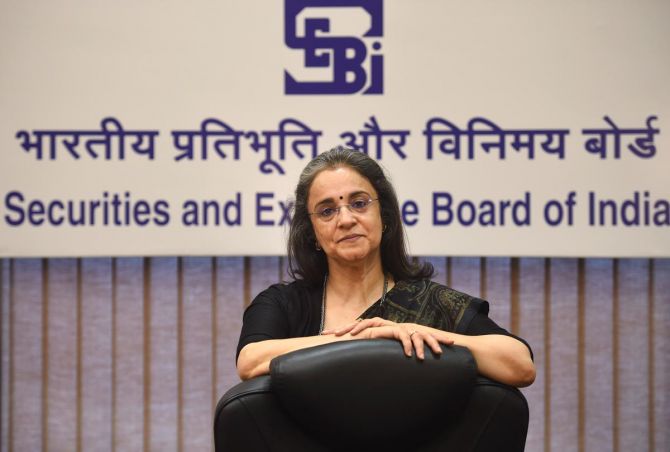Since 2016, Sebi has made many rules to prevent unauthorised trading by stockbrokers.
Yet, one comes across dozens of cases of blatant overtrading in client accounts, every year, leading to massive losses to investors, observes Debashis Basu.

Over the years the Securities and Exchange Board of India (Sebi) has issued dozens of circulars and guidelines to regulate market intermediaries who deal with retail investors such as stockbrokers, portfolio managers, investment advisors (IAs), and research analysts (RAs).
However, if the sole focus is on compliance, disclosure, and reporting, regulations stop serving the real interest of customers.
Let me concentrate on just one issue: Who can offer buy/sell advice to investors?
Sebi's regulatory architecture has correctly tried to create distinct classes of regulated entities defined by the type of activity.
For example, only mutual funds and portfolio management services (PMS) can accept money and invest on behalf of customers.
Similarly, for decades, only one regulated entity -- the stockbroker -- has been offering buy/sell advice to retail investors.
In 2013, for the first time, Sebi created a class of regulated entities called IAs, following it up with another class called RAs in 2014.
All three can now offer buy/sell recommendations on stocks, which is what most retail investors look for.
Unfortunately, it is not clear why three entities are allowed to do the same job.
From the investors' perspective, it is also unclear what distinguishes one from the other and advisors themselves are confused.
Almost nine years after the IA and RA regulations were introduced, most investors and advisors are unaware that RAs can recommend buy/sell on individual securities but cannot create a model portfolio of securities.
Advice through model portfolios was never explicitly prohibited under RA rules.
Hence, RAs offering 'model portfolios' mushroomed.
Why, there is even a flourishing platform called Smallcase, which is supposed to be the Amazon of stock advice, where hundreds of model portfolios are on display for the public to subscribe to.
To the shock of the investing community, on May 6, Sebi published a settlement order with an RA entity, which was hauled up for offering model portfolios, and it was apparently disallowed.
A former executive director of Sebi, who headed the legal department, joined issue on Twitter, arguing in a detailed thread that the regulator's order was incorrect.
Meanwhile, in a completely contrary stand, at least two individual RAs who openly stated in their applications that they wished to offer model portfolios have received Sebi clearance! There is no clarity in Sebi too whether RAs can offer model portfolios.
The analyst who was hauled up said it paid up only to avoid expensive and prolonged litigation, which would have hurt its business more.
Let's now look at brokers as IAs. Since 2016, Sebi has made many rules to prevent unauthorised trading by stockbrokers.
Yet, one comes across dozens of cases of blatant overtrading in client accounts, every year, leading to massive losses to investors.
Many cases are backed by sham technical compliance.
The biggest names in the broking business, many of them listed, have been repeatedly hauled up for serious misdemeanour, which remains hidden from investors since arbitration and grievance redress orders are tagged 'confidential'.
Even the biggest rogues among RAs and IAs cannot match such misdemeanour because, unlike brokers, they have no access to clients' funds.
Consequently, employees of broking firms pose as derivatives experts to generate massive loss-making trades by targeting senior citizens or less savvy customers.
In one case, a very senior citizen investor who has never traded more than Rs 5 lakh a year suddenly was doing derivatives trades of Rs 1.32 crore in two months with a mere Rs 255 credited to his account as earnings and no explanation.
The trades were over Rs 6.25 crore. The broker ensured technical compliance with regulations (margin and ledger statements, emails and SMS messages).
The unsuspecting citizen was tutored to place specific orders for transactions he did not understand on calls from the broker.
Soon he was selling his core portfolio to meet debits.
In another case, a broker verbally promised to help an investor earn a steady return every month by selling call and put options on the Nifty.
He handed over his investment portfolio of Rs 1.25 crore spread across 57 scrips, many of them blue-chips like Hindustan Unilever, Asian Paints, Pidilite, and Dabur.
This strategy earned some returns but when the market crashed, it inflicted huge losses.
The broker sold the blue-chip stocks, which were the life savings of a retiree to cover the losses.
Such stories are just too numerous to pretend that brokers are blameless, but they go unpunished.
So, what is to be done? Let's go back to core principles.
What investors look for are buy/sell recommendations.
Of the three sets of regulated entities (brokers, RAs, IAs) who is best placed to provide them? Until Sebi was set up, stockbrokers were the only market intermediaries and they performed multiple functions.
Then came specific regulations for each market intermediation activity.
Banks, depositories, and custodians handle transacted assets and portfolio managers and mutual funds manage investment.
Their role is clearly delineated, but it is time for a fresh look at the business of advice for retail.
Although stockbroking has become highly regulated in the past 28 years, malfeasance, horrible advice, bad faith, incompetence, and outright fraud are not uncommon.
Stockbrokers ought to be only a means to execute trades and they have a monopoly on that activity.
They ought not to be allowed to offer advice, because Sebi has already created two intermediaries for that activity.
Such a move will ensure far greater accountability for advisors.
That still leaves us with confusion about how to differentiate between role of RAs and IAs as regards buy/sell advice.
This can also be resolved with a simple principle.
Any buy/sell advice, including a model portfolio, should be the domain of RAs while holistic financial planning and asset allocation should be that of IAs.
Debashis Basu is the editor of moneylife.in
Feature Presentation: Aslam Hunani/Rediff.com












